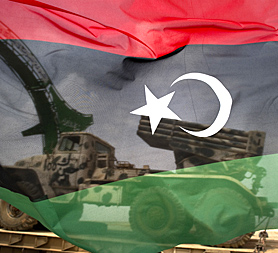Libya to work with African leaders for ‘real ceasefire’
In an exclusive interview ahead of talks in Tripoli with African leaders, Libya’s foreign minister tells Foreign Affairs Correspondent Jonathan Rugman he will work for a “real ceasefire”.
Libya’s new Foreign Minister says he is “hoping to work with others to arrange a real ceasefire”, ahead of a visit to Tripoli today by five African Union leaders who are trying to negotiate an end to the fighting between the country’s government and rebels.
“It is not the first time the African Union and the United Nations have brokered a ceasefire,” said Abdul Ati Al-Obeidi, in an exclusive interview with Channel 4 News. “Whatever this high level committee advises, we will listen to.”
The South African President, Jacob Zuma, is due in the Libyan capital this afternoon with the leaders of Uganda, Mauritania, Congo and Mali – the most senior delegation to visit Tripoli since fighting erupted in February.
Mr Al-Obeidi is adamant that the status of Muammar Gaddafi, Libya’s leader, cannot form any part in negotiations, amid demands from rebel leaders and western governments that he abandon power after 41 years.
“Now is not the time to discuss this issue,” Mr Al-Obeidi said. “To say he must go out now complicates any solution. He is the leader and he is helping and advising.”

Mr Al-Obeidi took over as Foreign Minister last week after his predecessor, Moussa Koussa, defected to the UK.
One of Colonel Gaddafi’s sons, Seif al-Islam Gaddafi, sent an envoy to London last month, while Mr Al-Obeidi recently visited Greece and Turkey in the search for a diplomatic end to the crisis.
Libya’s Foreign Minister denied there was any contradiction between various diplomatic initiatives and said he would be meeting Colonel Gaddafi later today.
Channel 4 News special report - Libya war: strike against Gaddafi
“We should come to a ceasefire first,” he said, claiming the future of Libya’s leader was a separate issue for the Libyan people to decide.
“Why should Cameron or Sarkozy say he must go?”, he said. “UN resolutions do not say anything about the leader leaving this country. If we want to succeed, I don’t think we should negotiate this issue until we have a new constitution.”
-
Latest news
-
Windrush scandal: returning to the UK after a forty year wait6m

-
Netanyahu ‘survival’ depends on ‘expanding war’ says head of Palestinian National Initiative5m

-
Proposed law change could strip parental rights from paedophiles5m

-
Hugh Grant settles privacy lawsuit against The Sun newspaper publisher2m

-
Post Office Scandal: what did top executive know?6m

-




